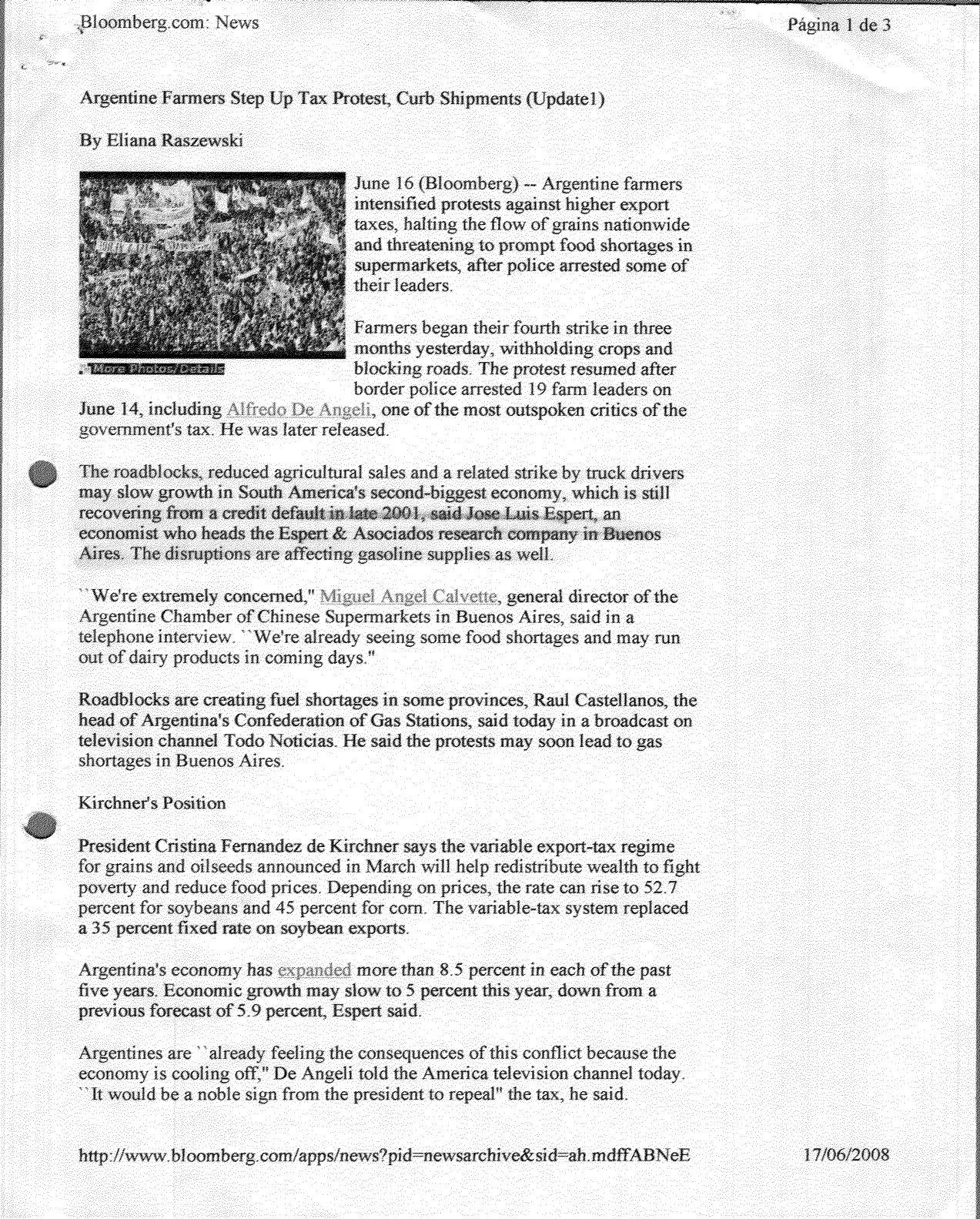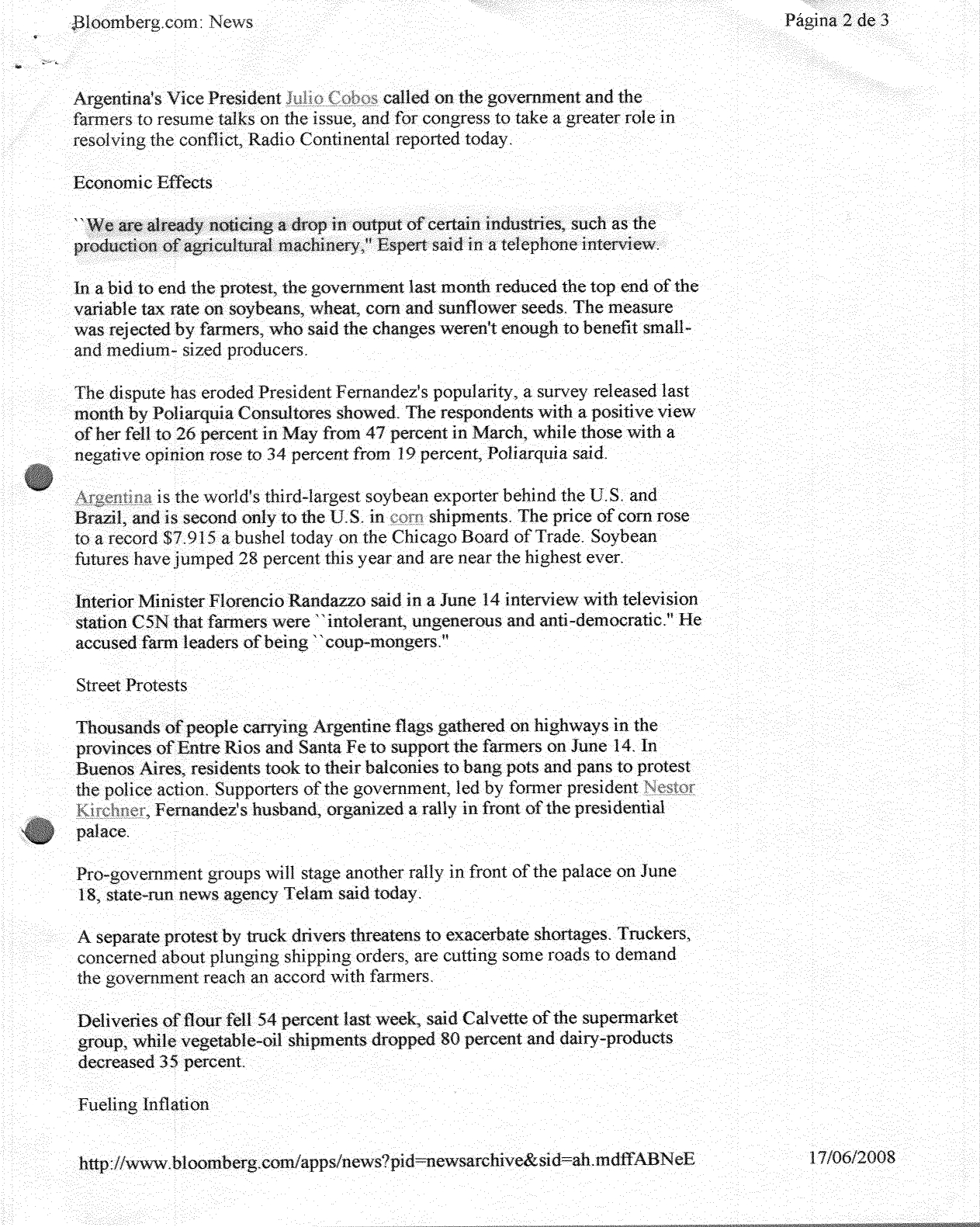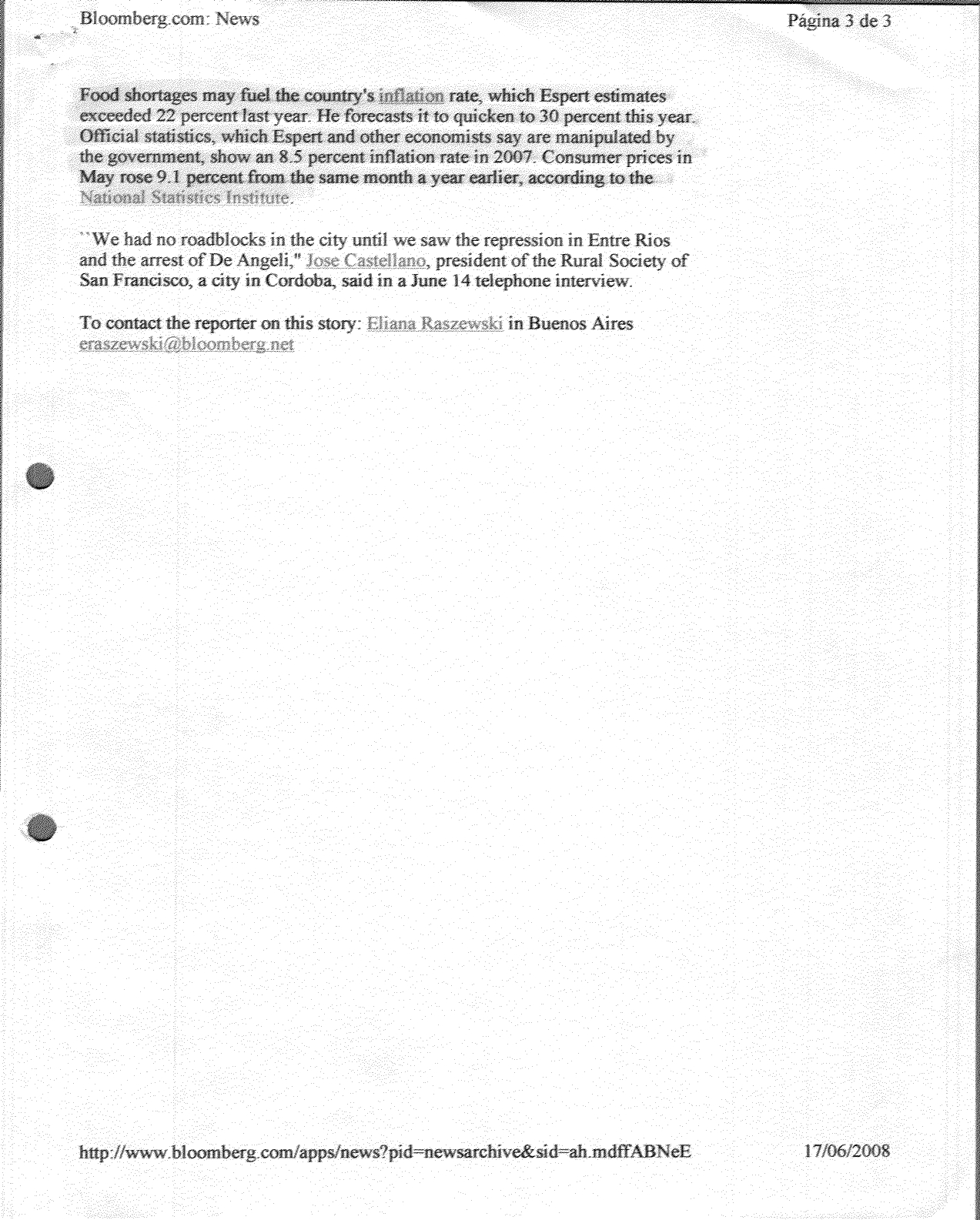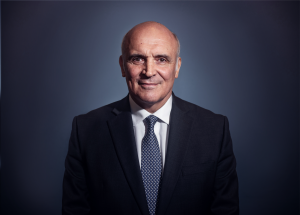June 16 (Bloomberg) — Argentine farmers intensified protests against higher export taxes, halting the flow of grains nationwide and threatening to prompt food shortages in supermarkets, after police arrested some of their leaders.
Farmers began their fourth strike in three months yesterday, withholding crops and blocking roads. The protest resumed after border police arrested 19 farm leaders on June 14, including Alfredo De Angeli, one of the most outspoken critics of the government’s tax. He was later released.
The roadblocks, reduced agricultural sales and a related strike by truck drivers may slow growth in South America’s second-biggest economy, which is still recovering from a credit default in late 2001, said Jose Luis Espert, an economist who heads the Espert & Asociados research company in Buenos Aires. The disruptions are affecting gasoline supplies as well.
“We’re extremely concerned,” Miguel Angel Calvette, general director of the Argentine Chamber of Chinese Supermarkets in Buenos Aires, said in a telephone interview. “We’re already seeing some food shortages and may run out of dairy products in coming days.”
Roadblocks are creating fuel shortages in some provinces, Raul Castellanos, the head of Argentina’s Confederation of Gas Stations, said today in a broadcast on television channel Todo Noticias. He said the protests may soon lead to gas shortages in Buenos Aires.
Kirchner’s Position
President Cristina Fernandez de Kirchner says the variable export-tax regime for grains and oilseeds announced in March will help redistribute wealth to fight poverty and reduce food prices. Depending on prices, the rate can rise to 52.7 percent for soybeans and 45 percent for corn. The variable-tax system replaced a 35 percent fixed rate on soybean exports.
Argentina’s economy has expanded more than 8.5 percent in each of the past five years. Economic growth may slow to 5 percent this year, down from a previous forecast of 5.9 percent, Espert said.
Argentines are “already feeling the consequences of this conflict because the economy is cooling off,” De Angeli told the America television channel today. “It would be a noble sign from the president to repeal” the tax, he said.
Argentina’s Vice President Julio Cobos called on the government and the farmers to resume talks on the issue, and for congress to take a greater role in resolving the conflict, Radio Continental reported today.
Economic Effects
“We are already noticing a drop in output of certain industries, such as the production of agricultural machinery,” Espert said in a telephone interview.
In a bid to end the protest, the government last month reduced the top end of the variable tax rate on soybeans, wheat, corn and sunflower seeds. The measure was rejected by farmers, who said the changes weren’t enough to benefit small-and medium- sized producers.
The dispute has eroded President Fernandez’s popularity, a survey released last month by Poliarquia Consultores showed. The respondents with a positive view of her fell to 26 percent in May from 47 percent in March, while those with a negative opinion rose to 34 percent from 19 percent, Poliarquia said.
Argentina is the world’s third-largest soybean exporter behind the U.S. and Brazil, and is second only to the U.S. in corn shipments. The price of corn rose to a record $7.915 a bushel today on the Chicago Board of Trade. Soybean futures have jumped 28 percent this year and are near the highest ever.
Interior Minister Florencio Randazzo said in a June 14 interview with television station C5N that farmers were “intolerant, ungenerous and anti-democratic.” He accused farm leaders of being “coup-mongers.”
Street Protests
Thousands of people carrying Argentine flags gathered on highways in the provinces of Entre Rios and Santa Fe to support the farmers on June 14. In Buenos Aires, residents took to their balconies to bang pots and pans to protest the police action. Supporters of the government, led by former president Nestor Kirchner, Fernandez’s husband, organized a rally in front of the presidential palace.
Pro-government groups will stage another rally in front of the palace on June 18, state-run news agency Telam said today.
A separate protest by truck drivers threatens to exacerbate shortages. Truckers, concerned about plunging shipping orders, are cutting some roads to demand the government reach an accord with farmers.
Deliveries of flour fell 54 percent last week, said Calvette of the supermarket group, while vegetable-oil shipments dropped 80 percent and dairy-products decreased 35 percent.
Fueling Inflation
Food shortages may fuel the country’s inflation rate, which Espert estimates exceeded 22 percent last year. He forecasts it to quicken to 30 percent this year. Official statistics, which Espert and other economists say are manipulated by the government, show an 8.5 percent inflation rate in 2007. Consumer prices in May rose 9.1 percent from the same month a year earlier, according to the National Statistics Institute.
“We had no roadblocks in the city until we saw the repression in Entre Rios and the arrest of De Angeli,” Jose Castellano, president of the Rural Society of San Francisco, a city in Cordoba, said in a June 14 telephone interview.
Nota Original: BLOOMBERG | 17/06/2008




